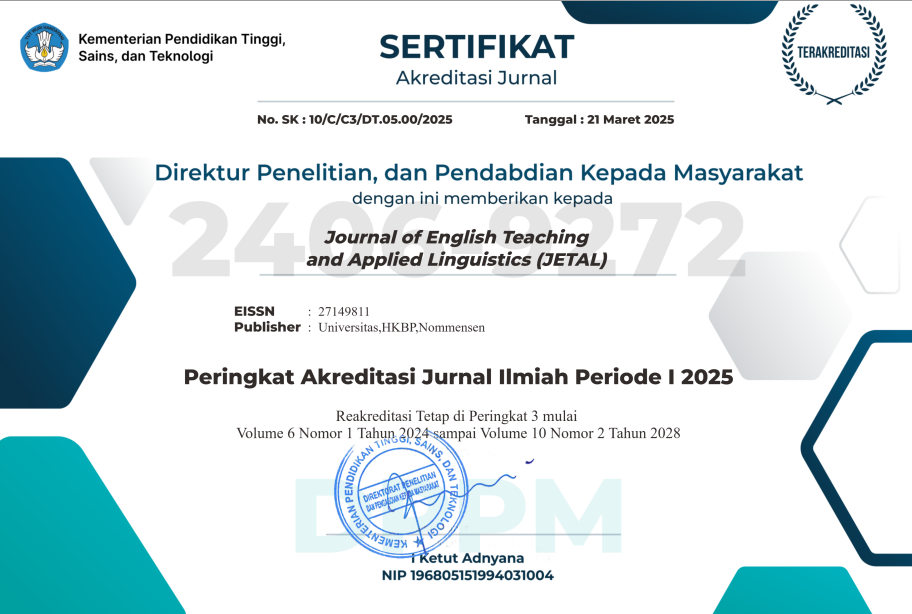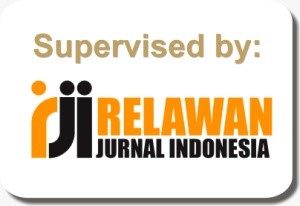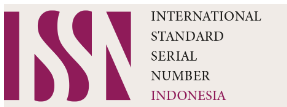THE USE OF DIGITAL AUDIO IN ENHANCING EFL LEARNERS’ LISTENING PROFICIENCY
Abstract
Listening is a critical ability to have, not only because of the time it takes in interactions but also because of its role in daily life. This study has been designed to explore the use of digital audio in promoting listening proficiency. Further research is required to determine how this position affects speakers of Indonesian who are learning English as a foreign language (EFL). A comparative study served as the foundation for this study's design. In this study, the research participants were at the upper secondary level, and their listening ability was examined in relation to the effects of digital audio (online podcasting on Spotify). Sixty students were involved in the study based on their performance on the placement test. Findings from the post-test showed that the group exposed to digital audio experienced an increase in their listening proficiency level, while the group not exposed to digital audio showed a little improvement in their proficiency level. By looking at the N-gain of their results, the group whose participants were not taught using active listening had an N-gain of 0.62, while the improvement of the second group resulted in an N-gain of 0.76, indicating that the group increased their listening proficiency level. The findings of this study showed that, with a result of 0.0235, there was no significant difference between the two teaching groups, where the significant value was greater than 0.005. claiming that while there is some difference between the two methods, it is not very much, and that both improve listening skills.
References
Learning: Beyond No Significant Difference and
Future Horizons. MERLOT Journal of Online
Learning and Teaching, 11(2), 309–319.
Agustina Lestary. (2021). An Exploration On The
Use Of Podcast In Speaking Class. ENLIT
Journal, 1(1), 1.
https://doi.org/10.33654/enlit.v1i1.1242
Al-Shamsi, A., Al-Mekhlafi, A. M., Busaidi, S. Al,
& Hilal, M. M. (2020). The effects of mobile
learning on listening comprehension skills and
attitudes of omani EFL adult learners.
International Journal of Learning, Teaching and
Educational Research, 19(8), 16–39.
https://doi.org/10.26803/IJLTER.19.8.2
Alfian, Lio, A. &, & Marafat, L. ode S. (2019). The
Use of Audio Podcast for Teaching Listening
Comprehension. Journal of Language Education
and Educational Technology, 4(1), 1–12.
http://dx.doi.org/10.33772/jleet.v4i1.6671
Amankulova, Z. I., & Seisembieva, S. K. (2022).
Teaching English as a foreign language. Analele
Universitatii Din Craiova, Seria Filozofie, 33(1–
2), 271–279.
https://doi.org/10.47408/jldhe.v0i1.14
Andrews, R. (2022). Children and Parents media use
and attitudes report 2022. Classical Comedy
1508-1786, March, 195–206.
https://doi.org/10.2307/j.ctv33b9pgg.29
Arsari, M. (2022). The Importance of Digital Literacy
to Enhance Students’ ability in English
Language. Jambura Journal of English …,
3(April), 12–18.
http://download.garuda.kemdikbud.go.id/article.
php?article=2812707&val=14436&title=The
Importance of Digital Literacy to Enhance
Students’ ability in English Language
Ayatfard, F. (2022). Effect of Digital Audio Files on
EFL Learners ’ Listening Skill. 4(2), 1014–1028.
Bao, L. (2006). Theoretical comparisons of average
normalized gain calculations. American Journal
of Physics, 74(10), 917–922.
https://doi.org/10.1119/1.2213632
Dyan, I. (2022). Using podcast for EFL students in
language learning. JEES (Journal of English
Educators Society), 5(2), 103–108.
https://doi.org/10.21070/jees.v5i2.767
Edirisingha, P., Rizzi, C., Nie, M., & Rothwell, L.
(2022). Podcasting to provide teaching and
learning support for an undergraduate module on
english language and communication. Turkish
Online Journal of Distance Education, 8(3), 87–
107.
Fitria, T. N. (2021). Investigating the Emergence of
Digital Platforms for Listening Learning
Proficiency. Al-Lisan, 6(2), 209–224.
https://doi.org/10.30603/al.v7i2.2217
Gilakjani, A. P., & Sabouri, N. B. (2019). Learners’
Listening Comprehension Difficulties in English
Language Learning: A Literature Review.
English Language Teaching, 9(6), 123.
https://doi.org/10.5539/elt.v9n6p123
Guntara, Y. (2021). Normalized Gain Treatment
Effectiveness Measure. Universitas Sultan
Ageng Tirtayasa, March, 1–3.
https://doi.org/10.13140/RG.2.2.27603.40482
Haleem, A., Javaid, M., Qadri, M. A., & Suman, R.
(2022). Understanding the role of digital
technologies in education: A review. Sustainable
Operations and Computers, 3(February), 275–
285. https://doi.org/10.1016/j.susoc.2022.05.004
Harahap, S. D. (2020). PODCAST IMPACTS ON
73
STUDENTS’ LISTENING SKILL: A CASE
STUDY BASED ON STUDENTS’
PERCEPTIONS. 21(1), 1–9. http://journal.umsurabaya.ac.id/index.php/JKM/article/view/2203
Hasan, M. M., & Hoon, T. B. (2019). Podcast
applications in language learning: A review of
recent studies. English Language Teaching,
6(2), 128–135.
https://doi.org/10.5539/elt.v6n2p128
Horiba, Y., & Fukaya, K. (2020). Reading and
learning from L2 text: Effects of reading goal,
topic familiarity, and language proficiency.
Reading in a Foreign Language, 27(1), 22–46.
https://scholarspace.manoa.hawaii.edu/handle/10
125/66699
ICES. (2021). IMPROVING STUDENTS’
LISTENING COMPREHENSION BY USING
SPOTIFY APPLICATION AT CLASS (Issue
March).
Ismayatim, W. F. A., Wahab, N. A., Yunus, M. M.,
Zamri, N. A., Nazri, N. D. M., & Hashim, H.
(2022). Enhancing 21st century students’
listening skills via augmented reality and mobile
applications. International Journal of
Innovation, Creativity and Change, 7(11), 314–
325.
Jobirovich, Y. M. (2021). Advantages of the
introduction of digital technologies into the
educational process. Journal of Culture,
Literature, and ELT, 7, 17–20.
https://literature.academicjournal.io/index.php/lit
erature/article/view/60#additionalNotes
K Dayanand, A. (2020). Hypothesis Types and
Research. International Journal of Nursing
Science Practice and Research, 4(2), 78–80.
Katrancı, M., & Melanlıoğlu, D. (2022). The
Listening Barriers Scale for University Students:
A Study of Validity and Reliability.
International Journal of Progressive Education,
18(3), 165–182.
https://doi.org/10.29329/ijpe.2022.439.12
Khalilavi, M. (2022). Using podcasts in learning
English language pronunciation among preintermediate students. … of New Advances in
English Language Teaching and …, 4(1), 725–
738.
http://www.jeltal.ir/article_144690.html%0Ahttp
://www.jeltal.ir/article_144690_64165e555a339
acd9a4a336f3f5c876d.pdf
Mayalisa, I., Andris Susanto, D., & Wahyu
Widiyanto, M. (2023). The use of English Song
on s[potify to motivate students’ speaking ability
(A Case of The Eighth Students of SMP
Purnama 2 Semarang In The Academic Year
2022/2023). JMAS Jurnal Pengabdian
Masyarakat EISSN, 1(5), 665–680.
http://melatijournal.com/index.php/JMAS
Miftahul Reski Putra Nasjum. (2020). Podast
Impacts on Students’ Listening Skill. Kaos GL
Dergisi, 8(75), 147–154.
https://doi.org/10.1016/j.jnc.2020.125798%0Aht
tps://doi.org/10.1016/j.smr.2020.02.002%0Ahttp
://www.ncbi.nlm.nih.gov/pubmed/810049%0Ah
ttp://doi.wiley.com/10.1002/anie.197505391%0
Ahttp://www.sciencedirect.com/science/article/p
ii/B9780857090409500205%0Ahttp:
Mirsa Umiyati, LAron Meko Mbete, Mirsa
Umiyati1, Aron Meko Mbete, Adi Cerman,
Nurdin, & Alexsander Loi. (2022). Improving
Listening Ability in English Learning for
Students At Smp Pgri 3 Denpasar. Linguistic
Community Service Journal, 3(2), 61–67.
https://www.google.com/search?q=https%3A%2
F%2Fwww.ejournal.warmadewa.ac.id%2Findex
.php%2Flicosjournal%2Farticle%2Fdownload%
2F5498%2F3833&safe=strict&sxsrf=AJOqlzW
nozSa2w1OVDoCjRJeev2Fc8v1zA%3A167525
3804474&ei=LFjaY4TTHLOA3LUPmMKJsA
Q&ved=0ahUKEwiEmbLfpvT8AhUzALcAHR
hhAkYQ4dUDCA8&uact=5&oq=https%3A%2
F%2Fwww.ejournal.warmadewa.ac.id%2Findex
.php%2Flicosjournal%2Farticle%2Fdownload%
2F5498%2F3833&gs_lcp=Cgxnd3Mtd2l6LXNl
cnAQAzoHCCMQ6gIQJzoNCAAQjwEQ6gIQt
AIYAUoECEEYAEoECEYYAVCfB1ifB2C3C
mgBcAF4AIABogKIAaICkgEDMi0xmAEAoA
EBoAECsAEQwAEB2gEGCAEQARgK&sclie
nt=gws-wiz-serp
Namaziandost, E., Esfahani, F. R., & Ahmadi, S.
(2019). Varying levels of difficulty in L2
reading materials in the efl classroom: Impact on
comprehension and motivation. Cogent
Education, 6(1).
https://doi.org/10.1080/2331186X.2019.161574
0
Nurchalisa, P. (2019). Lecturers ’ Strategies : the Use
of Media and Material in Teaching Listening.
https://repository.ar-raniry.ac.id/id/eprint/7321/
Nurhayati, T. (2022). Teaching English Vocabulary
Using Giw for Student. 137–141.
Putra, E. (2022). The Importance of Learning English
Nowadays THE IMPORTANCE OF
LEARNING ENGLISH NOWADAYS Erlangga
Putra Sepuluh Nopember Institute of
Technology ( ITS ) , Surabaya , Indonesia.
Article, November, 6.
Rafique, R. (2021). Using Podcasts to Improve
Listening Skills of Tertiary Level Learners:
Insights from Literature. Researchgate.Net,
October.
https://www.researchgate.net/profile/RumanaRafique2/publication/355338688_Using_Podcasts_to_I
mprove_Listening_Skills_of_Tertiary_Level_Le
arners_Insights_from_Literature/links/616a8e12
b90c5126624be9ac/Using-Podcasts-to-ImproveListening-Skills-of-Tertiar
Rahayuningsih, R., Rosalinah, Y., & Subroto, I.
(2021). Teaching Listening Ability Through
Podcast For 8 th Grade Students At Smp 181
Jakarta. Wanastra : Jurnal Bahasa Dan Sastra,
13(2).
https://doi.org/10.31294/w.v12i1http://ejournal.b
si.ac.id/ejurnal/index.php/wanastra/93
Removed, A., Request, A. T., & Original, O. F.
(2022). Understanding Media and Culture: An
Introduction to Mass Communication.
Understanding Media and Culture: An
Introduction to Mass Communication.
https://doi.org/10.24926/8668.2601
Ricoy, M. C., Martínez-Carrera, S., & MartínezCarrera, I. (2022). Social Overview of
Smartphone Use by Teenagers. International
Journal of Environmental Research and Public
Health, 19(22).
https://doi.org/10.3390/ijerph192215068
Rintaningrum, R., & Pangaribuan, N. I. D. L.
(2021). the Importance of Digital Literacy.
Conference: Class Conference, January.
Sewagegn, A. A. (2020). Learning objective and
assessment linkage: Its contribution to
meaningful student learning. Universal Journal
of Educational Research, 8(11), 5044–5052.
https://doi.org/10.13189/ujer.2020.081104
Sukmawati. (2021). the Use of English Podcast
Application To Improve. 123.
Tarmawan, I., Rusdiyana, R., Salim, A. D. P., &
Ulpah, A. P. (2021). The Role of Podcasts as an
Alternative Media for Learning and Distribution
of Audio Based Content. International Journal
of Research and Applied Technology, 1(1), 1–8.
https://doi.org/10.34010/injuratech.v1i1.5453
Tyagi, B. (2021). Listening: an important skill and its
various aspects. The Criterion: An International
Journal in English, 12(1), 1–8. https://www.thecriterion.com/V4/n1/Babita.pdf
Whitehead, E. (2020). Application of Meta-Cognitive
Strategy Instruction in Listening Comprehension
to the Level III Student Teachers Evangelin
Whitehead. The Excellence in Education
Journal, 9(1), 104–119.
Zein, S., Sukyadi, D., Hamied, F. A., &
Lengkanawati, N. S. (2020). English language
education in Indonesia: A review of research
(2011-2019). Language Teaching, 53(4), 491–
523.
https://doi.org/10.1017/S0261444820000208
Zhang, P., & Graham, S. (2020). Learning
Vocabulary Through Listening: The Role of
Vocabulary Knowledge and Listening
Proficiency. Language Learning, 70(4), 1017–
1053. https://doi.org/10.1111/lang.12411
Authors retain copyright and grant the journal right of first publication with the work simultaneously licensed under a Creative Commons Attribution-ShareAlike 4.0 International License (CC BY-SA 4.0) that allows others to share the work with an acknowledgment of the work's authorship and initial publication in this journal.
Authors are able to enter into separate, additional contractual arrangements for the non-exclusive distribution of the journal's published version of the work (e.g., post it to an institutional repository or publish it in a book), with an acknowledgment of its initial publication in this journal.
Authors are permitted and encouraged to post their work online (e.g., in institutional repositories or on their website) prior to and during the submission process, as it can lead to productive exchanges, as well as earlier and greater citation of published work (See The Effect of Open Access).






